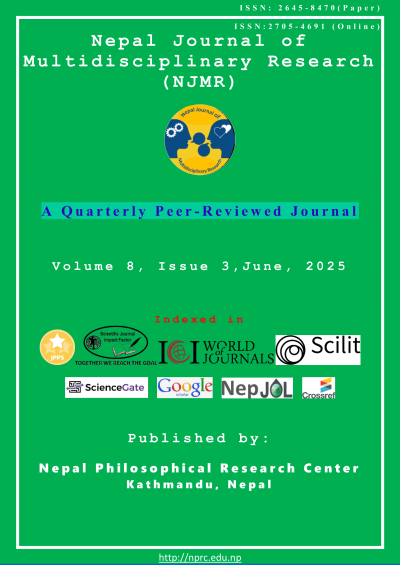Structural Drives and Common Sense: Building Conflict in Select Stories from B. P. Koirala and Guru Prasad Mainali
DOI:
https://doi.org/10.3126/njmr.v8i3.79098Keywords:
Self, Agency, Structure, Power, Knowledge, Common SenseAbstract
Background: Social structures shape the human self by developing a set of codes called common sense. Society founds certain types of knowledge over the other possible types that challenge the existing mores of the community. In the meantime, it produces a set of generally accepted codes that also promote inevitable inequality in society. In literary writings, the authors courageously challenge existing common sense, while other authors take the existing mores of the community as the ultimate grammar of social life.
Methods: This study applies Michel Foucault's new historicist lens of reading to Antonio Gramsci's idea of common sense to analyze and understand its political function in the short fiction of modern Nepali writers B. P. Koirala (1914-1982) and Guru Prasad Mainali (1900-1971).
Conclusion: In modern Nepali short stories, Koirala and Mainali represent two such distinct camps of writing: Koirala explores the political functions of common sense, but Mainali presents himself as the social conformist with a moral tone in each social affair. In Koirala's world, people attempt to find a new way of satisfying their bodies and society. The psychological reality also reasserts the political quest for a new societal order. On the other hand, Mainali's world is entirely peopled with subjects who have lost their size to social drives. He writes the stories of reconciliation.
Novelty: Short fiction serves as the field of data to explore the ideological base of society when it is interpreted in historical contexts. This study analyzes and presents the ideologies embedded in the fictional worlds of Koirala and Mainali, Koirala's Dosi Chasma [Faulty Glasses] (1949) and Mainali’s Naso [The Ward] (1969), as both collections depict the same period in Nepali society. Koirala's psychological rendering of society explores people's inner drive, while Mainali presents social reality and promotes existing morality.
Downloads
Downloads
Published
How to Cite
Issue
Section
License
Copyright (c) 2025 The Author(s)

This work is licensed under a Creative Commons Attribution-NonCommercial 4.0 International License.
This license enables reusers to distribute, remix, adapt, and build upon the material in any medium or format for noncommercial purposes only, and only so long as attribution is given to the creator.




